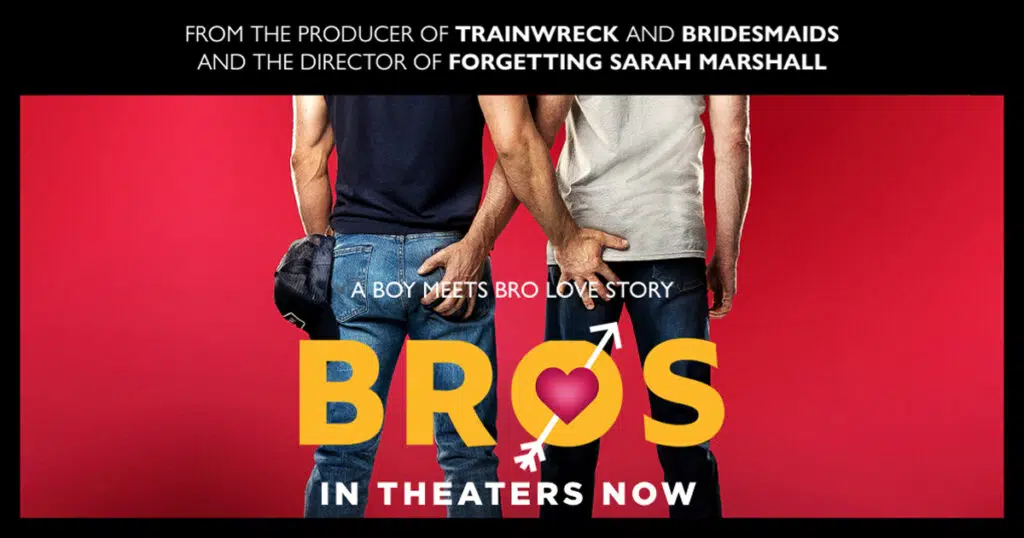
Memo to Hollywood: I’m Under ZERO Obligation to Watch Your Agenda-Driven Gay Romantic Comedies
This might seem too obvious to post about, but given the current paroxysms of misery and recrimination following the poor box office showing of the “historic” gay-centered movie Bros, which was touted by the usual suspects in Hollywood not for whether it was any good but for the identity politics it offered, I feel like I’m obligated to say something.
This movie was – and you’re supposed to care about this – the first gay romantic comedy by a major studio, the principal cast of which were mostly, if not all, “members of the LGBTQ community.” It had a $22 million budget, which is an awfully large number for a romantic comedy despite not carrying a particularly high-profile cast. It was directed by Nicholas Stoller (Forgetting Sarah Marshall, Get Him To The Greek, The Five-Year Engagement, Neighbors), and it stars Billy Eichner and Luke Macfarlane – who you’ve never heard of.
Eichner co-wrote the movie, and he seems to be its principal showrunner. That doesn’t seem to be such a great choice. But first, here’s the plot of Bros – and yes, these are spoilers, and we don’t care. From Wikipedia…
Bobby Leiber is doing another episode of his podcast and radio show The Eleventh Brick at Stonewall, talking to callers about his written works on gay history and gay icons. He claims to be fine with being single and not having found love, hooking up with random men over Grindr.
Bobby attends an awards ceremony for the LGBTQ community, where he wins an award for “Best Cis Male Gay Man”. He announces that he has accepted a position as a curator for the upcoming new National LGBTQ+ History Museum, the first such museum in the world.
Bobby joins his friend Henry at a nightclub where a new gay dating app is being launched, and spots Aaron Shepard, whom Henry describes as hot but “boring”. Aaron and Bobby flirt and exchange a kiss, but Aaron doesn’t appear interested in Bobby. A few days later, the two start to spend time together, but the relationship is rocky
When Bobby meets with Debra Messing, who wants to donate to the museum, he complains to her about his complicated relationship with Aaron. Messing gets angry, lamenting that many gay men vent to her because of her role on Will and Grace, and decides not to donate to the museum.
After some time apart, Bobby and Aaron spend an afternoon at a park, and then return to Aaron’s apartment to have sex. Aaron confides that his original dream was to be a chocolatier, but had thought that it was unachievable, and never pursued it.
Bobby invites Aaron to a trip to Provincetown, where he solicits an eccentric millionaire for a donation to the museum. The millionaire is unimpressed by Bobby at first, but Aaron helps him to adjust his pitch, and they score a $5 million donation. Bobby is impressed by Aaron and the two grow closer romantically, and Bobby opens up about having to tone down his flamboyant behavior to make others comfortable.
When Aaron’s family comes to the city for a visit, Bobby’s excessive outspoken behavior ends up causing a rift between the two men. Bobby attempts to use steroids to get fit, but he is interrupted by an emergency at the museum. People are threatening to boycott and pull donations over an exhibit that suggests that Abraham Lincoln was gay. Bobby wants to keep the exhibit, but his coworkers want to get rid of it, and they fight.
Bobby goes to the gym to workout after using steroids. He meets a guy there named Joel, and uses a lower-toned “bro” voice to appeal to him. They go back to Joel’s place to hook up, but when Bobby uses his real voice, Joel gets angry and tells Bobby to leave.
After some time, Bobby returns to work and reconciles with his coworkers over his anger issues. The others, including Angela and Wanda, all admit they have their own anger issues as well over matters such as their sexual identities. They all agree to compromise on the exhibits that will be presented. Meanwhile, Aaron quits his job and fulfills his dream of making chocolates, telling Bobby that all proceeds will go to the museum.
On the opening night of the museum, a large crowd turns out. Bobby misses Aaron, and after talking to his friend Tina, decides to text him, “Hey, what’s up?” Aaron gets the text and is encouraged by his brother to go after whom he loves. Aaron runs to the museum and arrives just as Bobby begins his speech. When he sees Aaron arrive, he proceeds to sing a song he wrote about their relationship, inspired by the music of Garth Brooks (Aaron’s favorite singer). When the song ends, Bobby and Aaron kiss, to applause from the crowd. They agree to date for three months before re-assessing their relationship.
Three months later, Annie brings her 2nd-grade class to the museum, and Bobby and Aaron are still dating. Bobby runs away playfully when Aaron asks if he ever wants kids.
Perhaps you can make a funny movie out of that, but in order to hold an audience’s interest one has to identify with the character and what he’s doing.
And an obnoxious gay activist who’s chasing down millionaires to donate to a gay activist museum when he isn’t pissing off virtually everyone and embarrassing his friends? What possible appeal does that have to somebody who isn’t a gay activist? How is that a relatable character?
How does such a movie even get made at all, much less with a $22 million budget?
This is a niche film. It’s an extreme niche film. It doesn’t even appeal to the gay niche. It appeals only to activist gay men – non-activist gay audiences would probably roll their eyes at that plot, since it doesn’t speak to their lives at all.
So of the 20 million or so gay people in America, based on the $4.8 million first-weekend box office draw it would appear that around a half-million people – and not all of them would necessarily be gay – bothered to attend.
Somehow this is the fault of straight people, according to Eichner.
It isn’t like this is the first gay movie Hollywood has ever made. For 30 years movies with gay characters and gay themes have been normal.
But this is the first big-budget movie made to appeal primarily to gay audiences without any real effort made at drawing a crossover audience.
And as said above, it managed to get less than three percent of Gay America to turn out to watch it. And its showrunner proceeded to attack straight audiences in Red America (he didn’t say it outright, but that’s who he was talking about) for the fact that it’s a flop which won’t make money for Universal Pictures, which was either browbeaten into producing it or was dumb enough to make the investment anyone could have told them would fail.
But as one of the people Eichner is blaming for his gay movie not making a profit, let me say this: I am under zero obligation to spend my money, the product of my time invested in work, to make you rich promoting a lifestyle I find intensely uninteresting.
I’m not saying you can’t be gay. If you want to be gay – if you want to make gay movies – that’s your business, and I’m happy to show you benign neglect. I’m not interested, and that isn’t a threat to you.
I’m not a threat to you. I’m happy to coexist on this planet with you. Do your thing, I’ll do mine, maybe our interests will coincide, maybe they’ll conflict. It is what it is.
But you have zero claim to my time, attention or allegiance. I don’t demand those things of you, and so you’ll get none of them from me. You haven’t earned them.
What’s worst about the modern LGBTQXYZ movement is that long ago they decided tolerance from the mainstream wasn’t enough. They had to force their behavioral choices on the rest of society and require our obeisance, and further to accept unrelated sexual identities whose arguments are antithetical to the gay argument as part of that surrender.
Think about the trans argument compared to the gay argument for just a little while and you’ll realize how utterly nonsensical this current moment is. The gay argument has it that they were born as they are; trans people most certainly were no such thing and in fact argue that sexual identity and orientation are a matter of social constructs and are therefore mutable. Why any gay American would agree with that is a mystery, and yet the rest of us are supposed to swallow it whole or else we show our bigotry.
So most of us quietly avoid the discussion altogether.
Which we hoped was enough.
But now, when a gay movie which doesn’t even bother to offer anything to appeal to straight people predictably fails to draw an audience, it’s the fault of straight “bigots.”
Straight men generally stay quiet about gay men these days due to the name-calling, but here’s the thing – that silence isn’t acceptance. It’s just silence. Straight men are disgusted by gay sex (not lesbian sex; that, we might have some prurient interest in given the right circumstances), and you simply cannot make us pay money to sit in a movie theater and watch gay men sodomize each other or even hint at such behavior. It grosses us out, and that doesn’t make us homophobes. It merely makes us straight, and we don’t need your permission or indulgence to not watch your movie.
Straight men, moreover, are not the natural audience for romantic comedies. We will watch them generally speaking as part of a date night with our straight-women romantic partners. Otherwise, it’s going to be a heavy lift to get us to spend time on that genre.
And when straight women get to advocate for the movies to watch on date nights, say for example on the weekend of September 30-October 2 of 2022, do you think a romantic comedy about gay men would be their first choice, or rather a romantic comedy about a man and a woman?
It’s no particular surprise that straight women, many of whom might well cultivate a gay male friend, would nonetheless neglect to drag their straight male romantic partners to a movie they’re fully aware would make him at the very least uncomfortable. That’s asking for a bad date, a foreseeable fight, and even a breakup.
And Billy Eichner, regardless of the high opinion he might hold himself in, doesn’t rate this level of risk.
Perhaps what’s most irritating about Bros is that it was greenlit by Universal – almost assuredly by someone high up in that studio who is gay and wanted to push an agenda – when it was obvious how limited the appeal of that film would be. And at the same time there had to be dozens of scripts for films which didn’t push left-wing, woke agendas and were discarded or never even read. Much less given a $22 million production budget.
When those scripts would have appealed, at least potentially, to half of the country or more.
This is a classic Get Woke, Go Broke scenario. It was eminently foreseeable, and the fact it happened at all shows just how bankrupt and in need of replacement Hollywood is.



